>>>>>>>>>
Saffron conspiracy against CPI(ML) in Giridih: Waves of resistance
by the people
JHARKHAND
Saffron conspiracy against CPI(ML) in Giridih
Waves of resistance by the people
|
The Saffron conspiracy against CPI(ML)
The litany of false cases@· Comrade Loknath Paswan
was booked under a false case lodged by the wife of an absentee landlord
that Loknath was the leader of the struggle to illegally occupy the land
belonging to the landlord.@· Comrade Rajkumar Yadav was booked in false
cases under Arms Act. Incidentally, the two witnesses for ‘arms seizure’
by the police produced affidavits in the court that they were forced by
the police at gunpoint to give witness against the accused.@· Comrade
Mahendra Singh was booked under such ridiculous cases like violation of
the election code of conduct in 1995. Some other cases were violation
of Section 144 in Hazaribagh in 1996 and in Koderma in 1997. The latest
case slapped on him relates to the road
ckade in Kodambari on 2 April 2002. It was on the
basis of an additional FIR lodged by the BDO, Rajdhanwar who was detained
at the road blockade. But the man lodged a complaint only 72 hours after
the road blockade. Clearly, he was acting under political pressure.
|
 COMRADE
MAHENDRA Singh, the CPI(ML) MLA in Jharkhand Assembly, has been in jail since
4 April. Earlier, Comrade Rajkumar Yadav, a popular leader of the Party from
Rajdhanwar, and Comrade Loknath Paswan, a state committee member of the Party,
were arrested under false cases. The powers that be
COMRADE
MAHENDRA Singh, the CPI(ML) MLA in Jharkhand Assembly, has been in jail since
4 April. Earlier, Comrade Rajkumar Yadav, a popular leader of the Party from
Rajdhanwar, and Comrade Loknath Paswan, a state committee member of the Party,
were arrested under false cases. The powers that be
Jharkhand have clearly panicked at the upsurge in popular mobilizations in Giridih
district under the CPI(ML) leadership. Ravindra Rai, a minister from Rajdhanwar
and a close confidante of Marandi was the kingpin behind the crackdown on the
CPI(ML). Comrade Rajkumar Yadav contested against Rai in the last assembly elections
and los
y a very narrow margin. Since then there has been a massive social
shift in the constituency in favour of CPI(ML). So, fearing for
political
future, Rai has become desperate. Incidentally, Giridih is also the home district
of Marandi. CPI(ML)’s surge there is a personal loss of face for him. Above
all, after Sibu Soren’s JMM surrendered to the BJP for the sake a Rajya Sabha
seat, CPI(ML) is the only fighting opposition within and without the Jharkhand
Assembly. The Saffron conspirators have unleashed the full might of the state
machinery hoping to crush the CPI(ML). But they have only ended up unlocking
the genie of popular resistance to defend democracy. A report by DP Buxi.
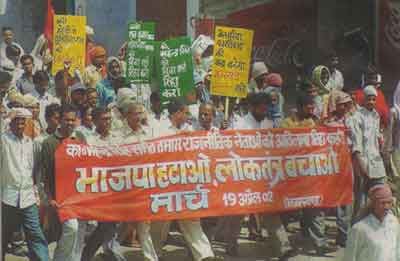 THE
CRACKDOWN in Giridih has its background. Thanks to our repeated political initiatives,
each involving tens of thousands of people, and incessant grassroots struggles
we have been able to enhance the political profile of
THE
CRACKDOWN in Giridih has its background. Thanks to our repeated political initiatives,
each involving tens of thousands of people, and incessant grassroots struggles
we have been able to enhance the political profile of
CPI(ML) and enlarge
its social base in Jharkhand. We are getting a good response throughout the
state and, except for South Chhota Nagpur, we have been able to make inroads
into all the regions of the state like Santhal Parganas and North Chota Nagpur.
We have been expanding in the trade union front also. It is Giridih district
which acted as the launching pad for this overall expansion. The social conditions
of the Giridih-Koderma belt have been ideal for this rapid expansion: backwards
constitute more than 50% of the population in this region and dalits, minorities
and adivasis together account for another 35% Earlier the RJD used to represent
these sections but this party quickly lost its relevance in the newly created
state. Hence its social base became fluid. Thanks to our stable foothold in
Bagodar (where our MLA, Comrade Mahendra Singh has been able to win thrice consecutively)
and the emergence of a strong core of leadership with Comrade Rajkumar Yadav
as the nucleus in the neighbouring constituency of Rajdhanwar (through militant
struggles against mafia, criminals and feudal forces) and, above all, the struggling
image of the Party, we have been able to attract this social base of the RJD.
It resulted in our sweeping expansion in Rajdhanwar and Gaoan blocks. Thus,
the ‘Red wave’, which originated in Bagodar, soon engulfed blocks like Tisri,
Jamua, Bengabad etc. like wildfire.
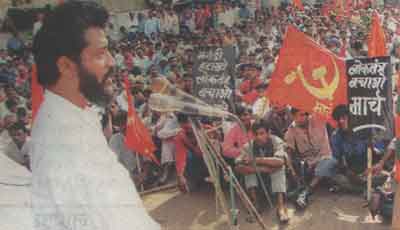 Apart
from incessant local struggles, this region also witnessed a spate of huge mass
mobilisations in recent times. Let us cite a few:
Apart
from incessant local struggles, this region also witnessed a spate of huge mass
mobilisations in recent times. Let us cite a few:
17 March 2002: More than 10,000 people participated in
the Samajik Parivartan Rally (Rally for Social Change) at Jamua addressed by
Party General Secretary Comrade Dipankar Bhattacharya.
23 March 2002: About
7000 people participated in Bhrashtachar Virodhi Rally (Anti-Corruption Rally)
at Deori block, addressed by Comrade Mahendra Singh.
24 March 2002: More than
5000 people gathered at the unveiling of the statue of Bhagat Singh at Saria
by Mahendra Singh.
25 March 2002: A large number of people protest arrest
of Comrade Loknath Paswan, a state committee member of the Party, during anti-liquor
campaign. The arrest was a joint JMM-police conspiracy to curb the growing assertion
of people in this region under the banner of CPI(ML).
26 March 2002: More
than 7000 people participate in Chunauti Rally (Challenge Rally) at Jutha Aam
in Birni block.
2 April 2002: More than 3000 people, including 1000 tribals
attend another Chunauti Rally at Tisri, which was addressed by Comrades Mahendra
Singh and Rajkumar Yadav.
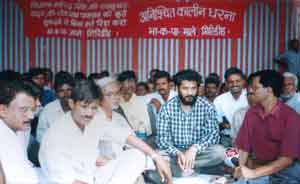 Saffron
forces in Jharkhand have sensed danger at this outstanding assertion of people
in Giridih district, the home district of the Chief Minister Babulal Marandi.
Moreover, Rajdhanwar is the constituency of Ravindra Rai, the righthand man
of Marandi and a member of his cabinet. Meanwhile the political agreement between
JMM (Soren) and the BJP over a Rajya Sabha seat for Sibu Soren emboldened the
Marandi government to isolate and demolish the CPI(ML), the only remaining viable
opposition and struggling force in Jharkhand. This is the background of the
conspiracy by Marandi and his coterie -- to let loose terror on CPI(ML) in Giridih
district and arrest its popular leaders like Mahendra Singh and Rajkumar Yadav.
Saffron
forces in Jharkhand have sensed danger at this outstanding assertion of people
in Giridih district, the home district of the Chief Minister Babulal Marandi.
Moreover, Rajdhanwar is the constituency of Ravindra Rai, the righthand man
of Marandi and a member of his cabinet. Meanwhile the political agreement between
JMM (Soren) and the BJP over a Rajya Sabha seat for Sibu Soren emboldened the
Marandi government to isolate and demolish the CPI(ML), the only remaining viable
opposition and struggling force in Jharkhand. This is the background of the
conspiracy by Marandi and his coterie -- to let loose terror on CPI(ML) in Giridih
district and arrest its popular leaders like Mahendra Singh and Rajkumar Yadav.
Now, a blow-by-blow account of the police
crackdown and people’s resistance:
2 April 2002: After attending the Tisri
rally, when Comrade Rajkumar Yadav was returning along with Comrade Mahendra
Singh and other leaders in a vehicle, it was suddenly encircled and he was arrested
by a huge contingent of police force drawn from three police stations. The place
of arrest was a remote one. Yet, about a thousand people, who observed the police
operation tried to chase away the police but could not succeed.
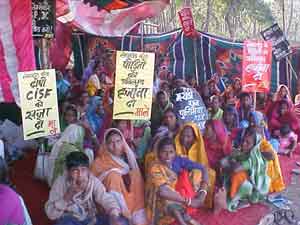 The
people gave vent to their anger immediately by launching a road blockade at
the nearby Kodambari Chowk. Around 3000 people had gathered for this road blockade.
During the road blockade the people stopped the vehicle of the local BDO. When
the BDO insulted and abused the people, they also paid him back in the same
coin and detained his vehicle. The police didn’t dare intervene and the blockade
continued till late in the night.
The
people gave vent to their anger immediately by launching a road blockade at
the nearby Kodambari Chowk. Around 3000 people had gathered for this road blockade.
During the road blockade the people stopped the vehicle of the local BDO. When
the BDO insulted and abused the people, they also paid him back in the same
coin and detained his vehicle. The police didn’t dare intervene and the blockade
continued till late in the night.
4 April 2002: On 4th April, the CPI(ML)
issued a call for Giridih Bandh to protest against the politically motivated
arrest of CPI(ML) leaders like Rajkumar Yadav and Loknath Paswan. Thousands
of people participated, making the bandh a total success throughout the district.
The Grand-Chord line of the railways was blocked from the midnight of 3 April
to 10.30 a.m. the next day. The Grand Trunk road was also blocked from morning
4.00 a.m. to night 8.00 p.m. on the bandh day. At Ghangri, the police (Bagodar
block) led by Bagodar Police Station incharge Ashoke Giri fired on the peaceful
demonstrators without any provocation. After the firing the people resisted
the police with bricks and forced them to retreat. But during the firing Comrade
Laldhan Mahato was killed and many others were injured. Comrade Laldhan was
a popular Party leader hailing from Beko village and had led a many a democratic
struggle of the rural poor. Comrade Mahendra Singh was also arrested on the
bandh day in Giridih town and detained in the Circuit House. The arrested activists
and leaders including Comrade Mahendra Singh were released that evening. After
his release, Comrade Mahendra Singh was returning to Bagodar with the body of
Comrade Laldhan after the post-mortem. On the way, he was encircled by a huge
contingent of police at Pirtaur and arrested again.
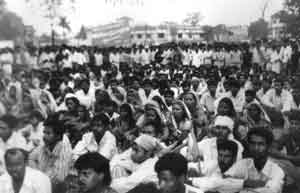 5
April 2002: Bail was granted for Comrade Mahendra Singh in the CJM court but
he was immediately rearrested under several other cases. The same day, a funeral
march of Comrade Laldhan Mahato was organised at Bandhan Tola, Beko. The 2000-strong
march was led by Party state secretary Comrade Suvendu Sen. A condolence-cum-sankalp
(pledge) meeting was also organised on the occasion.
5
April 2002: Bail was granted for Comrade Mahendra Singh in the CJM court but
he was immediately rearrested under several other cases. The same day, a funeral
march of Comrade Laldhan Mahato was organised at Bandhan Tola, Beko. The 2000-strong
march was led by Party state secretary Comrade Suvendu Sen. A condolence-cum-sankalp
(pledge) meeting was also organised on the occasion.
6 April 2002: Black-day was observed
throughout the state. Demonstrations were staged and the effigy of Marandi was
burnt everywhere. The immediate release of Comrade Mahendra Singh and other
CPI(ML) leaders and arrest of Ashoke Giri, the police official, under Section
302 were demanded. In Giridih, black day was observed in all the blocks with
large participation of people.
8 April 2002: An indefinite dharna was started
in Giridih as part of a continuous exposure campaign. Comrade Dipankar Bhattacharya
rushed to Giridih on 8 April. Getting down in Dhanbad station, he addressed
a protest rally within the station premises itself. After meeting the press
he rushed to Giridih and met the arrested Party leaders in jail. After addressing
a dharna he left for Bagodar and led a march of 2000 people to the house of
martyr comrade Laldhan Mahato and offered condolences to the bereaved family.
In Ranchi, Comrade Dipankar gave an ultimatum to the government to release the
arrested leaders. He termed the arrests a Saffron conspiracy to check the growth
of CPI(ML) in Jharkhand. “Inspired by Narendra Modi in Gujarat, Marandi is also
resorting to new experiments in police terror”, he said. “As it was a political
conspiracy”, Comrade Dipankar said, “there was no point in seeking legal remedy;
either the higher courts should intervene on their own or it would be up to
the people to decide the destiny of Mahendra Singh and other leaders”.
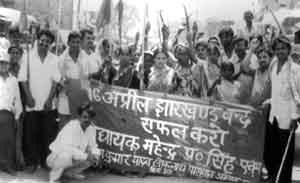 During
the 72-hour ultimatum period the dharna at Giridih was intensified for three
days. Meanwhile, Comrade Mahendra Singh also declared that Marandi’s game of
arresting him under some other case if he came out on bail in one case could
not go on and challenged Marandi to keep him in jail as long as could. Comrade
Mahendra Singh also declared that he would continue to carry on his struggle
against the corrupt and oppressive system from within the jail itself.
During
the 72-hour ultimatum period the dharna at Giridih was intensified for three
days. Meanwhile, Comrade Mahendra Singh also declared that Marandi’s game of
arresting him under some other case if he came out on bail in one case could
not go on and challenged Marandi to keep him in jail as long as could. Comrade
Mahendra Singh also declared that he would continue to carry on his struggle
against the corrupt and oppressive system from within the jail itself.
On
12 April 2002, a militant “Save Democracy March” of more than 5000 people was
organised in Giridih town to demand unconditional release of Comrade Mahendra
Singh and other leaders. It was led by Comrade DP Buxi, polit bureau member
and Suvendu Sen, state secretary of CPI(ML). The same day massive Jail Bharos
were organised in all other districts of Jharkhand.
13 April 2002: A blockade
of coal movement and ‘local sale’ of coal was organised in all coalfields of
Jharkhand on the same demand. Since Comrade Mahendra Singh is also the president
of the Coal Mine Workers’ Union, the coal workers participated in full strength
to secure the release of their leader.
16 April 2002: A call for Jharkhand
bandh was issued by the CPI(ML) combining the all-India general strike of workers
against privatisation with the struggle for democracy in Jharkhand.
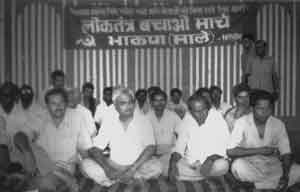 On
19 April around 4000 people marched in Ranchi in response to a call for Ranchi
Chalo issued by the Party. Comrade Dipankar, Party GS, and Comrades Ramjatan
Sharma and Akhilendra Pratap Singh, state secretaries of Bihar and UP addressed
the rally.
On
19 April around 4000 people marched in Ranchi in response to a call for Ranchi
Chalo issued by the Party. Comrade Dipankar, Party GS, and Comrades Ramjatan
Sharma and Akhilendra Pratap Singh, state secretaries of Bihar and UP addressed
the rally.
The morale of the CPI(ML) ranks is at an all-time high and the people’s anger
at the conspiracy of Babulal Marandi-Ravindra Rai and Co. is growing. Wide-ranging
forces have raised their voices of protest. Right from different left and democratic
parties like CPI, CPI(M), MCC, RSP and Forward Bloc to even RJD and JMM and
different social organisations, trade unions and progressive and democratic
personalities have raised their voice against the attack on democracy and called
for immediate release of Mahendra Singh and other CPI(ML) leaders. An upper
caste feudal lobby within the BJP is desperately carrying on a vicious campaign
against the so-called criminal activities of CPI(ML) and is demanding that the
state government invoke POTA against the CPI(ML) leaders. But the waves of mass
protest have suppressed their campaign. The media is also giving extensive coverage
to our campaign for democracy. The people at large are realising that the attack
on CPI(ML) is an attack on democracy, on the rural poor’s quest for a life with
dignity and on the assertion of dalits and tribals in Jharkhand.
>>>>>>>>>
 COMRADE
MAHENDRA Singh, the CPI(ML) MLA in Jharkhand Assembly, has been in jail since
4 April. Earlier, Comrade Rajkumar Yadav, a popular leader of the Party from
Rajdhanwar, and Comrade Loknath Paswan, a state committee member of the Party,
were arrested under false cases. The powers that be
COMRADE
MAHENDRA Singh, the CPI(ML) MLA in Jharkhand Assembly, has been in jail since
4 April. Earlier, Comrade Rajkumar Yadav, a popular leader of the Party from
Rajdhanwar, and Comrade Loknath Paswan, a state committee member of the Party,
were arrested under false cases. The powers that be
 THE
CRACKDOWN in Giridih has its background. Thanks to our repeated political initiatives,
each involving tens of thousands of people, and incessant grassroots struggles
we have been able to enhance the political profile of
THE
CRACKDOWN in Giridih has its background. Thanks to our repeated political initiatives,
each involving tens of thousands of people, and incessant grassroots struggles
we have been able to enhance the political profile of
 Apart
from incessant local struggles, this region also witnessed a spate of huge mass
mobilisations in recent times. Let us cite a few:
Apart
from incessant local struggles, this region also witnessed a spate of huge mass
mobilisations in recent times. Let us cite a few:
 Saffron
forces in Jharkhand have sensed danger at this outstanding assertion of people
in Giridih district, the home district of the Chief Minister Babulal Marandi.
Moreover, Rajdhanwar is the constituency of Ravindra Rai, the righthand man
of Marandi and a member of his cabinet. Meanwhile the political agreement between
JMM (Soren) and the BJP over a Rajya Sabha seat for Sibu Soren emboldened the
Marandi government to isolate and demolish the CPI(ML), the only remaining viable
opposition and struggling force in Jharkhand. This is the background of the
conspiracy by Marandi and his coterie -- to let loose terror on CPI(ML) in Giridih
district and arrest its popular leaders like Mahendra Singh and Rajkumar Yadav.
Saffron
forces in Jharkhand have sensed danger at this outstanding assertion of people
in Giridih district, the home district of the Chief Minister Babulal Marandi.
Moreover, Rajdhanwar is the constituency of Ravindra Rai, the righthand man
of Marandi and a member of his cabinet. Meanwhile the political agreement between
JMM (Soren) and the BJP over a Rajya Sabha seat for Sibu Soren emboldened the
Marandi government to isolate and demolish the CPI(ML), the only remaining viable
opposition and struggling force in Jharkhand. This is the background of the
conspiracy by Marandi and his coterie -- to let loose terror on CPI(ML) in Giridih
district and arrest its popular leaders like Mahendra Singh and Rajkumar Yadav.
 The
people gave vent to their anger immediately by launching a road blockade at
the nearby Kodambari Chowk. Around 3000 people had gathered for this road blockade.
During the road blockade the people stopped the vehicle of the local BDO. When
the BDO insulted and abused the people, they also paid him back in the same
coin and detained his vehicle. The police didn’t dare intervene and the blockade
continued till late in the night.
The
people gave vent to their anger immediately by launching a road blockade at
the nearby Kodambari Chowk. Around 3000 people had gathered for this road blockade.
During the road blockade the people stopped the vehicle of the local BDO. When
the BDO insulted and abused the people, they also paid him back in the same
coin and detained his vehicle. The police didn’t dare intervene and the blockade
continued till late in the night.
 5
April 2002: Bail was granted for Comrade Mahendra Singh in the CJM court but
he was immediately rearrested under several other cases. The same day, a funeral
march of Comrade Laldhan Mahato was organised at Bandhan Tola, Beko. The 2000-strong
march was led by Party state secretary Comrade Suvendu Sen. A condolence-cum-sankalp
(pledge) meeting was also organised on the occasion.
5
April 2002: Bail was granted for Comrade Mahendra Singh in the CJM court but
he was immediately rearrested under several other cases. The same day, a funeral
march of Comrade Laldhan Mahato was organised at Bandhan Tola, Beko. The 2000-strong
march was led by Party state secretary Comrade Suvendu Sen. A condolence-cum-sankalp
(pledge) meeting was also organised on the occasion.
 During
the 72-hour ultimatum period the dharna at Giridih was intensified for three
days. Meanwhile, Comrade Mahendra Singh also declared that Marandi’s game of
arresting him under some other case if he came out on bail in one case could
not go on and challenged Marandi to keep him in jail as long as could. Comrade
Mahendra Singh also declared that he would continue to carry on his struggle
against the corrupt and oppressive system from within the jail itself.
During
the 72-hour ultimatum period the dharna at Giridih was intensified for three
days. Meanwhile, Comrade Mahendra Singh also declared that Marandi’s game of
arresting him under some other case if he came out on bail in one case could
not go on and challenged Marandi to keep him in jail as long as could. Comrade
Mahendra Singh also declared that he would continue to carry on his struggle
against the corrupt and oppressive system from within the jail itself.
 On
19 April around 4000 people marched in Ranchi in response to a call for Ranchi
Chalo issued by the Party. Comrade Dipankar, Party GS, and Comrades Ramjatan
Sharma and Akhilendra Pratap Singh, state secretaries of Bihar and UP addressed
the rally.
On
19 April around 4000 people marched in Ranchi in response to a call for Ranchi
Chalo issued by the Party. Comrade Dipankar, Party GS, and Comrades Ramjatan
Sharma and Akhilendra Pratap Singh, state secretaries of Bihar and UP addressed
the rally.